Related Research Articles

A law school in the United States is an educational institution where students obtain a professional education in law after first obtaining an undergraduate degree.

Charlotte E. Ray was an American lawyer. She was the first black American female lawyer in the United States. Ray graduated from Howard University School of Law in 1872. She was also the first female admitted to the District of Columbia Bar, and the first woman admitted to practice before the Supreme Court of the District of Columbia. Her admission was used as a precedent by women in other states who sought admission to the bar.

Frederick Douglass High School, established in 1883, is an American public high school in the Baltimore City Public Schools district. Originally named the Colored High and Training School, Douglass is the second-oldest U.S. high school created specifically for African American students. Prior to desegregation, Douglass and Paul Laurence Dunbar High School were the only two high schools in Baltimore that admitted African-American students, with Douglass serving students from West Baltimore and Dunbar serving students from East Baltimore.
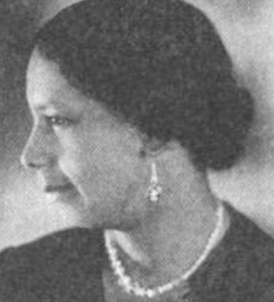
Lillie May Carroll Jackson, pioneer civil rights activist, organizer of the Baltimore branch of the NAACP. Invariably known as "Dr. Lillie", "Ma Jackson", and the "mother of the civil rights movement", Lillie May Carroll Jackson pioneered the tactic of non-violent resistance to racial segregation used by Martin Luther King Jr. and others during the early civil rights movement.
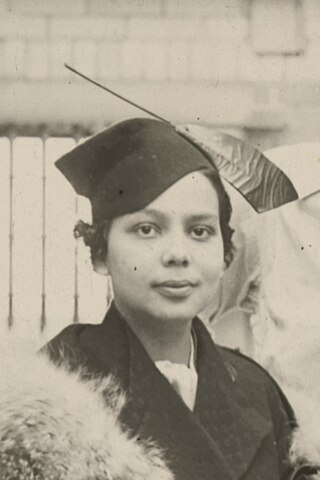
Juanita Elizabeth Jackson Mitchell was born in Hot Springs, Arkansas, and was the first African-American woman to practice law in Maryland. She was married to Clarence M. Mitchell, Jr., mother of two Maryland State Senators, and grandmother of one.

Howard University School of Law is the law school of Howard University, a private, federally chartered historically black research university in Washington, D.C. It is one of the oldest law schools in the country and the oldest historically black law school in the United States.
Gertrude Elzora Durden Rush was the first African-American female lawyer in Iowa, admitted to the Iowa bar in 1918. She helped found the National Bar Association in 1925.
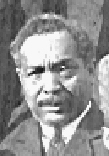
William Ashbie Hawkins (1862–1941) was a lawyer in Baltimore, Maryland, who litigated prominent civil rights cases. One of Baltimore's first African American lawyers, he was born in Lynchburg, Virginia, on August 2, 1862, to Reverend Robert and Susan Cobb Hawkins. One of Hawkins grandsons, Cromwell Ashbie Hawkins West, fabricated a Native American identity for himself and went by the name "Red Thunder Cloud".

Sarah Killgore Wertman, née Killgore was an American lawyer. She was the first woman to both graduate from law school and be admitted to the bar of any state in the United States, after graduating from the University of Michigan Law School and being admitted to the State Bar of Michigan in 1871.

Jack Aaron Guttenberg is an American jurist, legal scholar, and professor of law, who served as Dean of Capital University Law School from 2004 to 2010. He guided the school through implementation of the strategic plan, Building on our Momentum, Securing our Future.
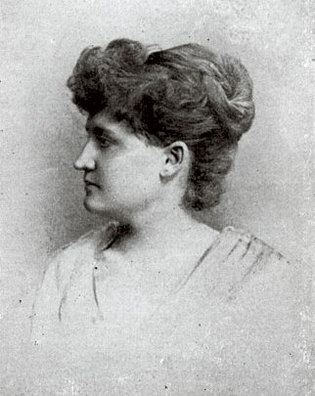
Alice Rufie Jordan Blake was the first female graduate of Yale University. After application and rejection from several other schools, she was able to enter Yale's law program after discovering that school regulations did not explicitly forbid female applicants.

Bessie Olive Cole (1883–1971) was an American pharmacist, called "The first lady of Pharmacy in Maryland".
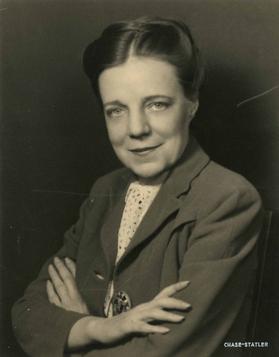
Vivian V. Simpson was an American lawyer. She was the first female lawyer in Montgomery County, the first woman elected president of the Montgomery County Bar Association, and the first female Secretary of State of Maryland.
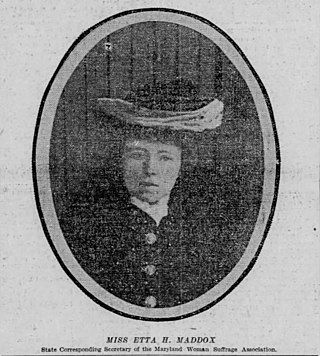
Henrietta Haynie Maddox was a vocalist, lawyer and suffragist. Maddox became the first woman in Maryland licensed to practice law in 1902. She fought for the rights of women to take the bar exam and practice law in the state of Maryland. She was a successful vocalist who studied at the Peabody Conservatory of Music before starting a second career as an attorney. She was the co-founder of the Maryland Woman Suffrage Association in 1894 and campaigned for equal pay for equal work. Maddox wrote the first Maryland suffrage bill introduced to the General Assembly on February 23, 1910.

Larry S. Gibson is a law professor, lawyer, political organizer, and historian. He currently serves as a professor at the Francis King Carey School of Law in the University of Maryland, Baltimore; where he has been on the faculty for 38 years. Gibson currently serves as council for the firm of Shapiro, Sher, Guinot, and Sandler. He was the principal advocate for the legislation that renamed Maryland's major airport, the Baltimore Washington International Thurgood Marshall Airport and published Young Thurgood: The Making of a Supreme Court Justice in 2012.
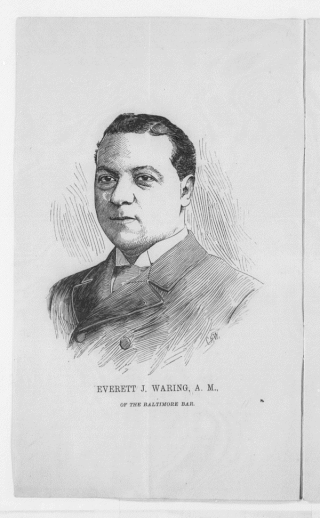
Everett J. Waring was the first African-American person admitted to the Maryland State Bar Association in 1885 and the Supreme Court Bench of Baltimore on October 10, 1885. He practiced before the Supreme Court of the United States and the Maryland State Appellate Court. He represented individuals involved in the Navassa Island riot of 1889, which occurred after African American men were lured to the island to gather guano to be used as fertilizer. The men were subject to inhumane treatment, low pay, and high cost of goods. He lost the Jones v. United States jurisdiction case and the men were found guilty.
References
- ↑ Smith, John Clay (1999). Emancipation: The Making of the Black Lawyer, 1844-1944. University of Pennsylvania Press. ISBN 9780812216851.
- ↑ Banks, Taunya Lovell (2004). "Setting the Record Straight: Maryland's First Black Women Law Graduates" (PDF). Maryland Law Review.
- ↑ The University of Michigan Law School Alumni Directory, 1859-1981. University of Michigan Law School. 1981.
- ↑ Carle, Susan D. (2005-08-22). Lawyers' Ethics and the Pursuit of Social Justice: A Critical Reader . NYU Press. p. 96. ISBN 9780814716397.
- ↑ Law school alumni directory, 1860-1950. University of Michigan Law School. 1951.
- ↑ "Juanita Jackson Mitchell, MSA SC 3520-2306". msa.maryland.gov. Retrieved 2019-08-29.
- ↑ Smith, John Clay (2000). Rebels in Law: Voices in History of Black Women Lawyers. University of Michigan Press. ISBN 9780472086467.